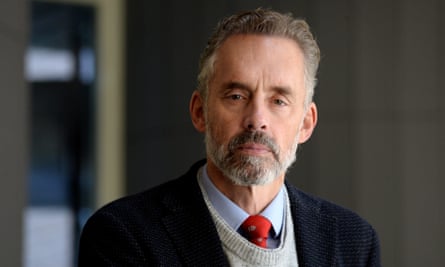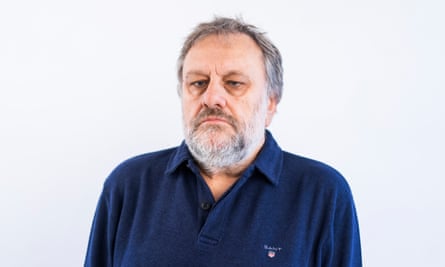The event was billed as “the debate of the century”, “The Rumble in the Realm of the Mind”, and it did have the feel of a heavyweight boxing match: Jordan Peterson, local boy, against the slapdash Slovenian Slavoj Žižek, considering “Happiness: Capitalism vs Marxism” in Toronto.
Peterson, in his opening remarks, noted that scalped tickets were selling at higher prices than the Maple Leafs playoff game happening on the other side of town. He couldn’t believe it. Who could?
Peterson and Žižek represent a basic fact of intellectual life in the twenty-first century: we are defined by our enemies.
Peterson has risen to fame on the basis of his refusal to pay the usual fealties to political correctness. The size and scope of his fame registers more or less exactly the loathing for identity politics in the general populace, because it certainly isn’t on the quality of his books that his reputation resides. Žižek is also defined, and has been for years, by his contempt for postmodern theory and, by extension, the more academic dimensions of political correctness.

Peterson’s opening remarks were disappointing even for his fans in the audience. They were a vague and not particularly informed (by his own admission) reading of The Communist Manifesto. His comments on one of the greatest feats of human rhetoric were full of expressions like “You have to give the devil his due” and “This is a weird one” and “Almost all ideas are wrong”.
I’ve been a professor, so I know what it’s like to wake up with a class scheduled and no lecture prepared. It felt like that. He wandered between the Paleolithic period and small business management, appearing to know as little about the former as the latter. Watching him, I was amazed that anyone had ever taken him seriously enough to hate him.
He said things like “Marx thought the proletariat was good and the bourgeoisie was evil”. At one point, he made a claim that human hierarchies are not determined by power because that would be too unstable a system, and a few in the crowd tittered. That snapped him back into his skill set: self-defense. “The people who laugh might do it that way,” he replied. By the end of his half-hour he had not mentioned the word happiness once.

Žižek didn’t really address the matter at hand, either, preferring to relish his enmities. “Most of the attacks on me are from left-liberals,” he began, hoping that “they would be turning in their graves even if they were still alive”. His remarks were just as rambling as Peterson’s, veering from Trump and Sanders to Dostoevsky to the refugee crisis to the aesthetics of Nazism. If Peterson was an ill-prepared prof, Žižek was a columnist stitching together a bunch of 1,000-worders. He too finished his remarks with a critique of political correctness, which he described as the world of impotence that masks pure defeat.
The great surprise of this debate turned out to be how much in common the old-school Marxist and the Canadian identity politics refusenik had.
One hated communism. The other hated communism but thought that capitalism possessed inherent contradictions. The first one agreed that capitalism possessed inherent contradictions. And that was basically it. They both wanted the same thing: capitalism with regulation, which is what every sane person wants. The Peterson-Žižek encounter was the ultra-rare case of a debate in 2019 that was perhaps too civil.
They needed enemies, needed combat, because in their solitudes, they had so little to offer. Peterson is neither a racist nor a misogynist. He is a conservative. He seemed, in person, quite gentle. But when you’ve said that, you’ve said everything. Somehow hectoring mobs have managed to turn him into an icon of all they are not. Remove him from his enemies and he is a very poor example of a very old thing – the type of writer whom, from Samuel Smiles’ Self-Help to Eckhart Tolle’s The Power of Now, have promised simple answers to complex problems. Rules for Life, as if there were such things.
The mere dumb presence of the celebrities on the stage mattered vastly more than anything they said, naturally. But there was one truly fascinating moment in the evening. It came right at the end of Žižek’s opening 30-minute remarks.
“We will probably slide towards apocalypse,” he said. And Peterson agreed with him: “It is not obvious to me that we can solve the problems that confront us.” They are both self-described “radical pessimists”, about people and the world. It made me wonder about the rage consuming all public discussion at the moment: are we screaming at each other because we disagree or because we do agree and we can’t imagine a solution?
Both of these men know that they are explicitly throwbacks. They do not have an answer to the real problems that face us: the environment and the rise of China as a successful capitalist state without democracy. (China’s success makes a joke out of the whole premise of the debate: the old-fashioned distinction between communism and capitalism.) Neither can face the reality or the future. Therefore they retreat.
Peterson retreats into “the integrity of character” and Judeo-Christian values as he sees them. Žižek is more or less a Gen X nostalgia act at this point, a living memento from a time when you would sit around the college bar and regale your fellow students about the time you saw that eastern European prof eating a couple of hot dogs in the street.
Unfortunately, this brief moment of confrontation of their shared failure couldn’t last. They returned to their natural subject: who is the enemy? Žižek asked what Peterson meant by cultural Marxists when postmodern thinkers, like Foucault, weren’t Marxist at all. Peterson was an expert on this subject, at least. He gave a minor history of the French critical theorists who transposed categories of class oppression for group oppression in the 1960s.
And they both agreed, could not have agreed more, that it was all the fault of the “academic left”. They seemed to believe that the “academic left”, whoever that might be, was some all-powerful cultural force rather than the impotent shrinking collection of irrelevances it is. If the academic left is all-powerful, they get to indulge in their victimization.
And that was the great irony of the debate: what it comes down to is that they believe they are the victims of a culture of victimization. They play the victim as much as their enemies. It’s all anyone can do at this point.
In the end Peterson-Žižek was less of a heavyweight boxing match than a WWE Grand Slam. Not that I was disappointed. I did see “the debate of the century”, the debate of our century. It was full of the stench of burning strawmen. A big deal, with huge numbers, and really very little underneath.

